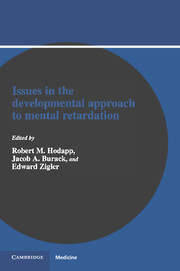Book contents
- Frontmatter
- Contents
- Preface
- Contributors
- Part 1 Developmental theory
- 1 The developmental perspective in the field of mental retardation
- 2 Differentiating mental retardation: The two-group approach and beyond
- 3 One road or many? Issues in the similar-sequence hypothesis
- 4 The similar-structure hypothesis and differential rate of development in mental retardation
- 5 Neo-environmental perspectives on developmental theory
- 6 The role of motivational factors in the functioning of mentally retarded individuals
- Part 2 Applying developmental theory to different types of retarded individuals
- Author index
- Subject index
4 - The similar-structure hypothesis and differential rate of development in mental retardation
from Part 1 - Developmental theory
Published online by Cambridge University Press: 07 September 2010
- Frontmatter
- Contents
- Preface
- Contributors
- Part 1 Developmental theory
- 1 The developmental perspective in the field of mental retardation
- 2 Differentiating mental retardation: The two-group approach and beyond
- 3 One road or many? Issues in the similar-sequence hypothesis
- 4 The similar-structure hypothesis and differential rate of development in mental retardation
- 5 Neo-environmental perspectives on developmental theory
- 6 The role of motivational factors in the functioning of mentally retarded individuals
- Part 2 Applying developmental theory to different types of retarded individuals
- Author index
- Subject index
Summary
The formulation or recognition of contrasting models is an essential process in any scientific enterprise. Just as the juxtaposition of color and line may intensify the perception of elements in a painting, so the contrast of models in science brings the fundamental principles and questions of a field of inquiry into clearer focus. Within the field of mental retardation the debate over the developmental and difference models has exemplified this process (Baumeister, 1987).
Two fundamental questions are commonly associated with this debate. The first concerns the etiology of mental retardation. Advocates of difference theories of mental retardation often maintain that mental retardation is the result of a distinct organic disturbance that leads to deficits in intellectual development. For example, Ellis and Cavalier (1982) have argued that mental retardation is presumptive evidence of organic pathology.
Alternatively, the developmental model suggests that there are two groups of mentally retarded individuals – one resulting from a distinct disturbance of physiology (e.g., Down syndrome or hydrocephaly), the other with an unknown etiology. It is assumed that for a significant number of individuals in this latter group, mental retardation results not from a distinct disturbance of organic process, but rather from natural, genetic variation in processes associated with intellectual development (Zigler, 1967; Zigler, 1982; Zigler & Hodapp, 1986).
Information
- Type
- Chapter
- Information
- Publisher: Cambridge University PressPrint publication year: 1990
Accessibility standard: Unknown
Why this information is here
This section outlines the accessibility features of this content - including support for screen readers, full keyboard navigation and high-contrast display options. This may not be relevant for you.Accessibility Information
- 9
- Cited by
